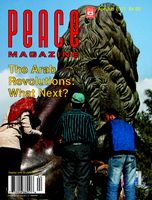
Peace Magazine Apr-Jun 2011, page 11. Some rights reserved.
Search for other articles by Rene Wadlow here
The wave of the people’s revolution has swept over Tunisia and pushed President Ben Ali to exile in Saudi Arabia. A month of popular manifestations starting on 17 December 2010 with the suicide-protest of the young Mohamed Bouazizi, a college-educated street vendor, and the police repression at his funeral has brought to an end the 23 years of control on Tunisian political and economic life by President Zine El-Abidine Ben Ali. He and his powerful wife Leila Trabelsi left Tunis on 14 January for exile in Saudi Arabia while other members of the extended family, who controlled large sectors of the economy, went to Paris.
Tunisia under Ben Ali was a police state in the literal sense of the word. There was a constant presence of the police with arrests, lengthy interrogations, torture, and for those with luck, exile. The press and other media were closely watched and in some cases owned by the Ben Ali-Trabelsi family.
From an economic point of view, there was a migration to the cities and larger towns of the coastal area in a frustrating search for suitable occupations. The unemployment rate was high, and among the educated youth, unemployment, lack of social mobility and the flashy lifestyle of those with links to political power led to demands for change.
The recent demonstrations seemed to have begun spontaneously, led by the young but with no previously known leaders. The demonstrations had no links to opposition political parties, most of whose leaders were in exile, and there were few opposition political structures. There were no known Islamic groups in the demonstrations, and Islamic influence seems to have been completely absent from the rallies and from the demands of the demonstrators.
For most French commentators, the model was “May 1968,” which led to the end of the government of Charles de Gaulle. Tunisia is a revolution of the people who wanted fundamental changes from the small political group governing, an end to widespread and highly visible corruption, and the creation of jobs. Ben Ali, like de Gaulle, symbolized the system and so there was strong agreement on what everyone could agree upon: “Ben Ali must go.” Unlike General de Gaulle, General Ben Ali had done nothing very special before becoming president. Although he tried to develop a “personality cult” with large pictures of himself in the streets and ever-present praise on television, Ben Ali had no real personality around which to develop a cult.
Now the issue is what structures the people’s revolution will give itself. A provisional government has been created with respected persons, and elections are to be held within 60 days. Since political parties had been prevented from operating—even the party of the President had only a name but no real structures—we will have to see how political factions are created prior to the elections. There are a good number of different ideological currents in the opposition to Ben Ali, and there is no opposition leader who stands out as a “natural” next president. There is always the danger that if there is too much disorder, revenge killings or armed groups forming the army could step in.
However, until now, the new forces have followed a policy of nonviolence; orderly trials for those accused of corruption are being organized.
The disintegration of Ben Ali’s government and power base has created a psychic wave that has spread throughout the Arab world. Egypt has changed regimes largely through determined nonviolent action. Yemen’s demonstrators have achieved some concessions and the demonstrations are growing. After protests, the King of Morocco has promised constitutional reforms, as has the King of Jordan. Protest currents are moving in Saudi Arabia, Algeria, and North Sudan. The conflict in Libya has turned violent, and as we go to press the outcome is unclear.
Throughout the Arab world, governments have been unable or unwilling to open serious discussions on socio-economic policies and alternatives. Islamic- based groups have played some role in focusing protests but have not done much in presenting realistic alternative policies. The violence of some of the Islamic groups has served as a pretext for the governments to ban all policy discussions without too many protests from Western governments.
What is outstanding in the revolution in Tunisia is that Islamic groups played no part in the demonstrations and that none of the demands were expressed in Islamic terms. The people’s revolution in Tunisia was based on the will of the people for change with a minimum of ideological coloring. It is likely that the people’s revolution in other Arab countries will also marginalize Islamic currents in favor of this-worldly reforms. Events will be closely watched both by those who hope and those who fear. People’s revolutions are on the march in the Arab world.
René Wadlow is representative to the United Nations, Geneva, for the Association of World Citizens.

Peace Magazine Apr-Jun 2011, page 11. Some rights reserved.
Search for other articles by Rene Wadlow here